द्वारा: मुहम्मद कासिम अल-हनफी
यह मेरे, एक मुसलमान की ओर से, निरंकुश लेखन, भाषणों और नारों के खिलाफ, सोशल मीडिया पर हिंदुओं द्वारा, और उनकी 'धर्म-सभा' सभाओं में, और उनकी धार्मिक रैलियों में, ब्रह्मांड के एकमात्र निर्माता 'अल्लाह' को बदनाम करने वाली एक प्रतिशोधात्मक कार्रवाई है। ', और रचना का सर्वश्रेष्ठ 'पैगंबर मुहम्मद (ﷺ)'। ये पंक्तियाँ इन निन्दकों और आलोचकों के लिए करारा जवाब होंगी। हमारी खामोशी हमारी कमजोरी नहीं, बल्कि धैर्य और समझदारी है। जाहिर है, हम मुसलमानों के पास हमेशा हमारे खिलाफ आरोप लगाने वालों के हर एक आरोप का एक स्मार्ट-एलेक रिवाइंडर होता है, खासकर जब यह हमारे सर्वशक्तिमान अल्लाह, या उनके प्यारे पैगंबर मुहम्मद (ﷺ) की बात आती है, जो सृष्टि का सबसे अच्छा है।
इस कार्य में मैं वाल्मीकि रामायण में वर्णित कुछ यौन सामग्री पर प्रकाश डालने जा रहा हूँ। हिंदू हमेशा अन्य धार्मिक ग्रंथों में कामुकता के बारे में बात करना पसंद करते हैं। निश्चय ही, यह उनके चरित्र का अभिन्न अंग है। ये धर्मांध हमेशा मनगढ़ंत आख्यान या अप्रमाणिक सन्दर्भों का हवाला देकर इस्लाम का उपहास उड़ाते हैं और हिंदुओं की इस मानसिक बीमारी का एकमात्र समाधान उन्हें आईना दिखाना और उनकी ही किताबों से उनके देवताओं और संतों के 'अश्लील कांड' बताना प्रतीत होता है। और याद रखें! मेरा हिंदुओं के धार्मिक व्यक्तित्वों का उपहास करने या उनकी भावनाओं को ठेस पहुंचाने का कोई इरादा नहीं है, जो मकड़ी के जाले से भी अधिक नाजुक हैं, और अमिताभ बच्चन द्वारा केबीसी में मनु स्मृति के बारे में एक सरल प्रश्न से आहत हो सकते हैं।
हिंदू साहित्य में विस्तृत अश्लीलता का उल्लेख इन दो जबड़ा तोड़ने वाले लेखों में किया गया है: ' हिंदू धर्म और वासना ', और ' वेदों में अश्लीलता '।
यहां, मैं केवल एक पुस्तक 'वाल्मीकि रामायण' से उद्धृत करूंगा, जिसे हिंदुओं द्वारा राम के जीवन के लिए महान कृति के रूप में स्वीकार किया गया है। हेयर यू गो:
1. सुन्दर काण्ड, अध्याय: 38, श्लोक: 11-27
जब हनुमान सीता से मिलते हैं, तो वे सीता से उन्हें स्मरण की निशानी देने के लिए कहते हैं, जिसे राम पहचान सकें। सीता तब जयंत (इंद्र के पुत्र) द्वारा चित्रकूट पर्वत पर घटित एक कौवे के रूप में प्रच्छन्न रूप से अपनी 'शारीरिक यातना' का प्रसंग सुनाती हैं, और हनुमान से स्मरण के टोकन के रूप में राम के सामने इसे दोहराने का अनुरोध करती हैं। एक थके हुए राम सीता की गोद में सो रहे थे, जब कौवे ने उन पर हमला किया। कहानी जारी है:
एवमुक्ता हनुमता सितार सुरसुतोपमा।
उवाच वचनं मन्दं भाष्पप्रग्रथिताक्षरम्।।5.38.11
इदं श्रेष्ठमभिज्ञानं ब्रूयास्त्वं तु मम प्रियम्।
शैलस्य चित्रकूटस्य पादे जीवित पुरा।।5.38.12
तापसाश्रमवासिन्याः प्राज्यमूलफालोदके।
तस्मिन्सिद्धाश्रमे देशे मन्दाकिन्या विदूरतः।।5.38.13
तस्योपवनषण्डेषु नानापुष्पसुगन्धिषु।
विहृत्य सलिले क्लिन्ना ममाङके समुपाविषमः।।5.38.14
ततो मांससमायुक्तो व्यासः पर्यतुण्डयत्।
तमहं लोष्टमुद्यम्य वारयामिस्म वायसम्।।5.38.15
दारायण्स च मां काकस्तत्रैव परिलीयते।
न चाप्युपरमनमान्साद्भक्षार्थी बलिभोजनः।।5.38.16
उत्कर्षन्त्यां च रशनां क्रुद्धायां मयि पक्षिणि।
स्रस्यमाने च वसने ततो दृष्टा त्वया ह्यहम्।।5.38.17
त्वयाऽपहसिता चाहं क्रुद्धा संलज्जिता तदा।
भक्षग्रध्नेन काकेन दारिता त्वामुपागता।।5.38.18
आसीनस्य च ते श्रान्ता पुनरुत्संगमविशम्।
क्रुध्यन्ती च प्रहृष्टेन त्वयाऽहं परिसान्तविता।।5.38.19
बाष्पपूर्णमुखी मन्दं चक्षुषी परिमार्जती।
लक्षिताऽहं त्वया नाथ वायसेन प्रकोपिता।।5.38.20
परिश्रमात्प्रसुप्ता च राघवाङकेऽप्यहं चिरम्।
पर्यायेन प्रसुप्तश्च ममाङके भरताग्रजः।।5.38.21
स तत्र पुनरेवथ यस्स्समुपागमत्।
ततस्सुप्तप्रबुद्धां मां रामस्याङकात्समुत्थिताम्।।5.38.22
वायस्सहसाग्म्य विददार स्तनान्तरे।
पुनरथोत्पत्य विददार स मां बृशम् ।।5.38.23
ततस्मुक्षितो रमो मुक्तैशोणितबिन्दुभिः।
वायसेन ततस्तेन बलवत्क्लिश्यमानया।।5.38.24
स माया बोधितश्श्रीमानसुखसुप्तः परन्तपः।
स मां दृष्ट्वा महाबाहु रवितुन्नां स्तनयो स्तदा।।5.38.25
आशीविष इव क्रुद्धश्वसन्वाक्यमभाषत।
केन ते नागनासोरु विक्षतं वैस्तितान्तरम् ।।5.38.26
कः क्रीडति सरोशेण पञ्चवक्त्रेण भोगिना।
वीक्षमाणस्ततं वै वायसं समुदैक्षत।।5.38.27
नखैसरुधिरास्तिकक्ष्णैर्मामेवाभिमुखं स्थितम्।
पुत्त्रुः किल स शक्रस्य वायसः पततां वरः।।5.38.28
धान्तरगतश्शीघ्रं पवनस्य गतौ समः।
"हनुमान की बात सुनकर भगवान की संतान सीता ने धीमे स्वर में ये शब्द कहे। आँसुओं से छलनी, 'मेरे प्यारे पति के लिए पहचान की यह निशानी ले जाओ':
“Long ago we were staying at Siddhashrama. This hermitage was situated to the northeast at the foot of Chitrakuta Mountain which was not far from the river Mandakini. It had abundant roots, fruits and water. You sported with me in the gardens which were fragrant with many types of flowers and ponds. You sat down on my lap with wet clothes in the hermitage.”
“Then a crow greedy of flesh began to peck my bosom with its beak. I took a clod of earth and warded him off.”
“The crow was an eater of offerings, hungry for food began to peck me again and again for flesh. He did not stop.”
“My upper cloth was slipping. I was trying to pull up my waist string angrily when you saw me.”
“Then you made fun of me, and I became angry. I was abashed. Torn by the voracious bird I sought your shelter.”
“Exhausted, I sat on your lap again. Seeing my angry face you pacified me. You were happy (to see me draw close).”
“O lord when I was angered by the crow and my face was filled with tears you marked me wiping my eyes.”
“Totally exhausted I slept on your lap for a long time, and in turn you slept on my lap later.”
“The crow came back again and clawed me in the space between my breasts even after I woke up after slumber from Rama’s lap. Flying, it tore my bosom again and again.”
“Then, Rama got wet by the discharged drops of blood. Thereafter, that splendorous Rama, the annihilator of enemies, who was in a pleasant slumber, was woken up by that crow and by me who was grievously tormented by the crow.”¹
“O strong-armed Rama, seeing my torn breasts, you became angry like a hissing serpent and hissing said:
‘O Sita, with a beautiful lap like an elephant trunk, by whom is your bosom wounded? Who is sporting with an angry five-hooded snake?’
“Then looking around, you saw the crow facing me with sharp, bloodstained claws.”
“This crow was the best of birds. He was surely Indra’s son who had covered a long distance with great speed and his speed was like the Windgod’s.” [Tr. IIT Kanpur]
Source: https://www.valmiki.iitk.ac.in/sloka?field_kanda_tid=5&language=dv&field_sarga_value=38
¹The translation of this only verse is taken from here: https://www.valmikiramayan.net/utf8/sundara/sarga38/sundara_38_frame.htm
Hindi Translation by Dwaraka Prasad Sharma:
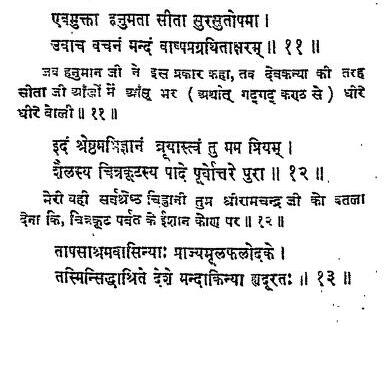
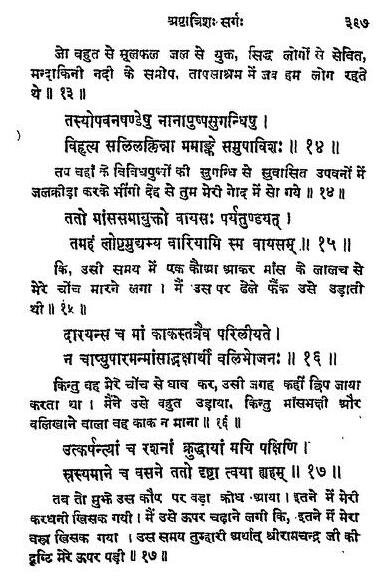
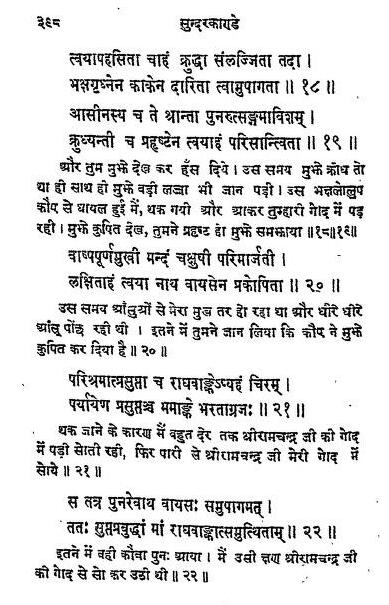
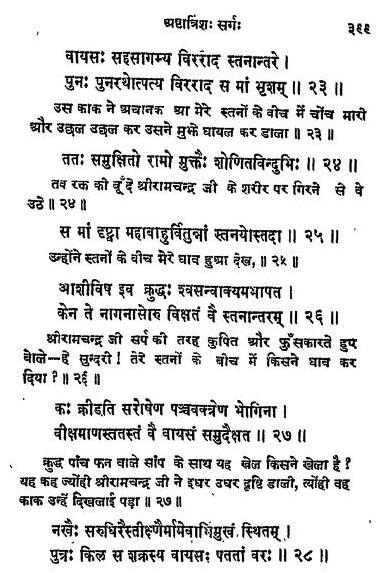

Now imagine!
A goddess of Hindus Sita is passing her time in romance with her Husband-god Rama, but Jayant, disguised as a crow, comes to tear Sita’s breasts, is also son of Hindu god Indra. I can’t understand which type of divinity this is, and which type of religious book the Ramayana is!
While the name of this ‘Kākāsura (काकासुर)’ is not explicitly mentioned as Jayant in the episode, various commentaries on the epic like the Tilaka and the Bhushana by Govindaraja identify Jayant as the ‘son of Indra’. Govindaraja says only Jayant is known as the son of Indra.
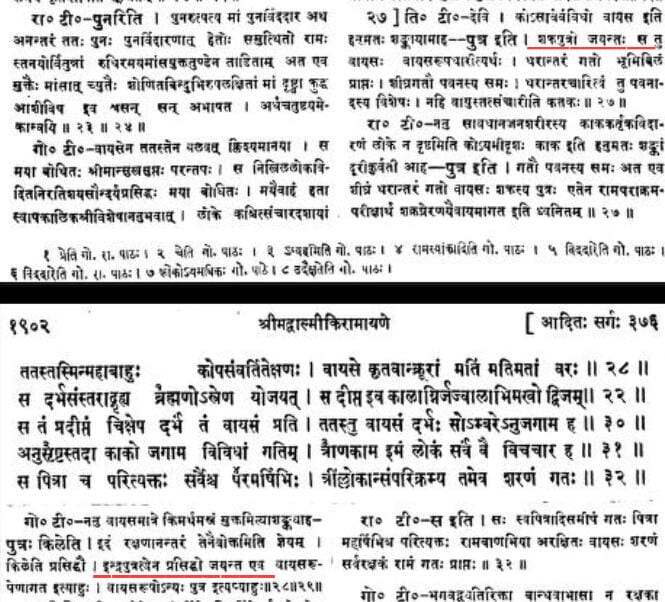
But, Tulsi Das fabricated the story in his ‘Ramcharitmanas’, and replaces the breast with feet. He writes in Aranya Kanda:
“सीता चरण चोंच हतिभागा। मूढ़ मंद मति कारन कागा।।”
“The stupid fool, who had disguised himself as a crow with a sinister motive, bit Sita in the foot with his beak and flew away.” [Tr. Geeta Press]
But no worries, because such types of textual adulteration are very common in Hindus.
But don’t forget: “Valmiki Ramayana is a religious book of Hindus.”
2. Ayodhya Kanda, Chapter: 91, Verses: 10-91
Having been instructed by Bhardwaja to bring the army to his place, Bharat (brother of Rama) allowed his army also to come to the hermitage. Then, Bhardwaja invokes Vishvakarma, the divine architect and requests him to arrange for a befitting hospitality to Bharat. The reader can refer to this full chapter, but I am quoting certain verses:
तेनैव च मूहूर्तेन दिव्याऽभरणभूषिताः।
आगुर्विंशतिसाहस्राः ब्रह्मणा प्रहिताः स्त्रियः।।2.91.43।।
सुवर्णमणिमुक्तेन प्रवालेन च शोभिताः।
आगुर्विंशतिसाहास्राः कुबेरप्रहिताः स्त्रियः।।2.91.44।।
याभिर्गृहीतः पुरुषस्सोन्माद इव लक्ष्यते।
आगुर्विंशतिसाहस्रा नन्दनादप्सरोगणाः।।2.91.45।।
अलम्बुसा मिश्रकेशी पुण्डरीकाऽथ वामना।
उपानृत्यंस्तु भरतं भरद्वाजस्य शासनात्।।2.91.47।।
सुरास्सुरापाः पिबत पायसं च बुभुक्षिताः।।2.91.52।।
मांसानि च सुमेध्यानि भक्ष्यन्तां यावदिच्छथ।।2.91.53।।
उच्छाद्य स्नापयन्ति स्म नदीतीरेष वल्गुषु।
अप्येकमेकं पुरषं प्रमदास्सप्त चाष्ट च।।2.91.54।।
संवाहन्त्यस्समापेतुर्नार्यो रुचिरलोचनाः।
परिमृज्य तथाऽन्योन्यं पाययन्ति वराङ्गनाः।।2.91.55।।
“At that very moment twenty thousand women adorned with beautiful ornaments sent by Brahma presented themselves.”
“Twenty thousand women adorned with gold, gems and corals sent by Kubera came.”
“Troops of twenty thousand apsaras by whom any man when taken hold of in their arms could be intoxicated with intense passion, came from Nandana gardens.”
“Thereafter, the apsaras, Alambusa, Misrakesi, Pundarika and Vamana danced near Bharata at the command of Bharadwaja.”
“‘O wine drinkers, drink as much as you can those who are hungry partake payasam and sacred meat’.”
“Every single warrior was attended by seven or eight women who applied oil and massaged his body and bathed him on the lovely banks of the river.”
“Some women with beautiful eyes quickly approached them for massaging. The best of ladies wiped their bodies dry and gave each other wine to drink.” [Tr. IIT Kanpur]
Source: https://www.valmiki.iitk.ac.in/sloka?field_kanda_tid=2&language=dv&field_sarga_value=91
Hindi Translation by Dwaraka Prasad Sharma:
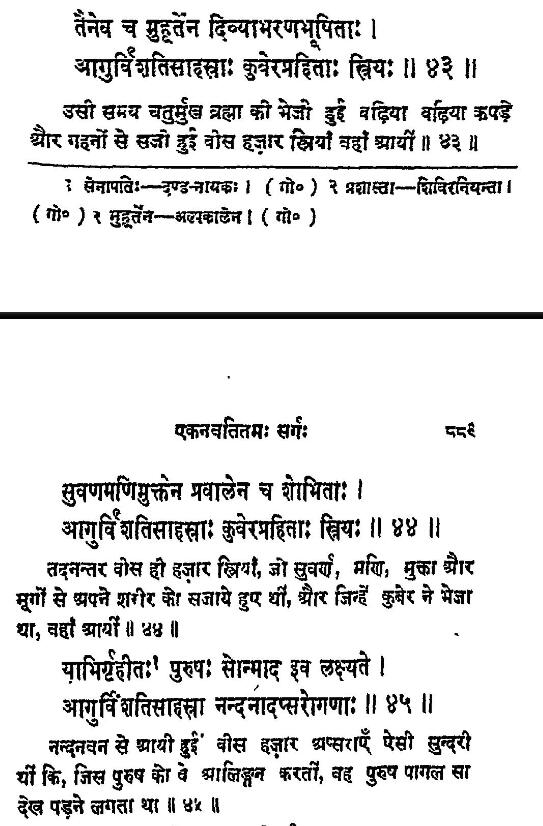
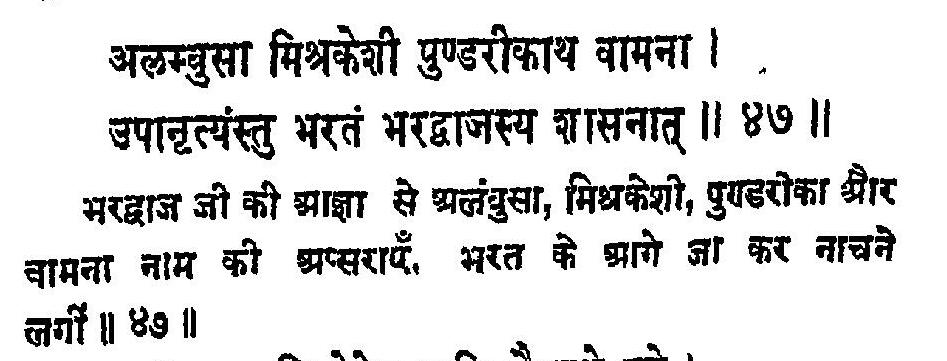
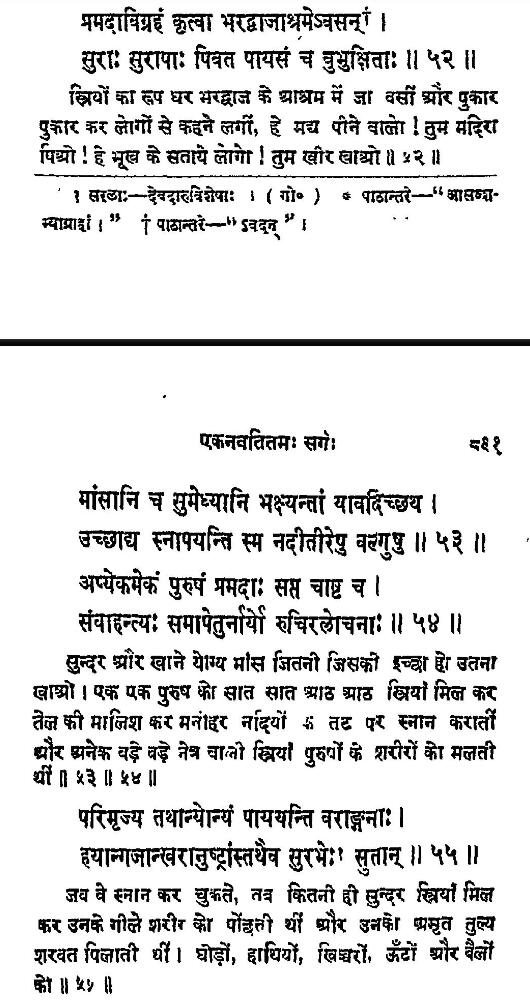
One can see in above-mentioned verses, the roots of ‘Dancing/Nautch Girls’ custom. Hindu personalities gained a particular reputation for their licentiousness as a result of the activities of the ‘nautch girls’. As part of the entertainment for the royal family, these highly skilled dancers performed for the ruler and entertained his guests. They also formed part of everyday life for those outside the palaces, as people invited them to perform at celebrations, festivals, and fairs. These women were valued for their intelligence as well as their dancing skills. As a form of side employment they offered sexual services, and they would cover themselves in gold as an outward sign of their wealth. Every Hindu temple of any importance possessed a troupe of nautch girls: some acted as priestesses, married in childhood to the idols and obliged by their vocation to prostitute themselves to men of every caste; others acted as mistresses to the temple priests. Such prostitution was not looked down on, and even distinguished families were proud to have daughters dedicated to the temple’s service. At one time it was estimated that twelve thousand such temple prostitutes existed in Madras alone. For the Hindu deities, the nautch girls were the embodiment of sexuality, highly erotic seductresses who had the ability to charm all males. Indeed, seventeenth-century travelers frequently portrayed India as a hotbed of vice and full of prostitutes. The only reason for this is that the roots of this fornication go back to the Hindu scriptures.
The verses 52-53 are teaching about ‘Date Rape’, because those dancing girls took ‘liquor (सुराः)’ for Bharat & his army. It means the ‘Date Rape Drugs’ originated from this ancient culture of Hinduism.
A ‘date rape drug’ is any drug that incapacitates another person and renders that person vulnerable to a sexual assault, including rape. Alcohol, consumed voluntarily, is the most commonly used drug involved in sexual assaults. Researchers agree that the drug most commonly involved in drug-facilitated sexual assaults is alcohol, which the victim has consumed voluntarily in most cases. In most jurisdictions, alcohol is legal and readily available and is used in the majority of sexual assaults. Many perpetrators use alcohol because their victims often drink it willingly, and can be encouraged to drink enough to lose inhibitions or consciousness. Sex with an unconscious victim is considered rape in most jurisdictions and some assailants have committed ‘rapes of convenience’, assaulting a victim after he or she had become unconscious from drinking too much.
Source: https://www.survive.org.uk/date-rape.html
And the verses 54-55 are encouraging ‘erotic massage’, and beach fornication. The person providing the massage is called a masseur (male) or masseuse (female).
“Erotic massage is a means through which two people in an intimate relationship touch and stimulate each other, communicate love and tenderness too. Touch and massage, therefore, are the perfect tools for sexual foreplay.”
Source: https://www.counselling-directory.org.uk/memberarticles.html
Now the reader can understand the roots of adultery, being committed in massage parlors and at beaches.
But don’t forget: “Valmiki Ramayana is a religious book of Hindus.”
3. Balkanda, Chapter: 48, Verses: 17-31
On enquiry by Rama, sage Vishwamitra relates the story of Gautama’s curse to his wife Ahalya:
तस्यान्तरं विदित्वा तु सहस्राक्षश्शचीपति:।।1.48.17।।
मुनिवेषधरोऽहल्यामिदं वचनमब्रवीत्।
ऋतुकालं प्रतीक्षन्ते नार्थिनस्सुसमाहिते।।1.48.18।।
सङ्गमं त्वहमिच्छामि त्वया सह सुमध्यमे।
मुनिवेषं सहस्राक्षं विज्ञाय रघुनन्दन।।1.48.19।।
मतिं चकार दुर्मेधा देवराजकुतूहलात्।
अथाब्रवीत् नरश्रेष्ठ कृतार्थेनान्तरात्मना।।1.48.20।।
कृतार्थाऽस्मि सुरश्रेष्ठ गच्छ शीघ्रमित: प्रभो।
आत्मानं मां च देवेश सर्वदा रक्ष गौतमात्।।1.48.21।।
इन्द्रस्तु प्रहसन् वाक्यमहल्यामिदमब्रवीत्।
सुश्रोणि परितुष्टोऽस्मि गमिष्यामि यथाऽगतम्।।1.48.22।।
एवं सङ्गम्य तु तया निश्चक्रामोटजात्तत:।
स सम्भ्रमात्त्वरन् राम शङ्कितो गौतमं प्रति।।1.48.23।।
गौतमं तं ददर्शाथ प्रविशन्तं महामुनिम्।
देवदानवदुर्धर्षं तपोबलसमन्वितम्।।1.48.24।।
तीर्थेंदकपरिक्लिन्नं दीप्यमानमिवानलम्।
गृहीतसमिधं तत्र सकुशं मुनिपुङ्गवम्।।1.48.25।।
दृष्ट्वा सुरपतिस्त्रस्तो विवर्णवदनोऽभवत्।
अथ दृष्ट्वा सहस्राक्षं मुनिवेषधरं मुनि:।।1.48.26।।
दुर्वृत्तं वृत्तसम्पन्नो रोषाद्वचनमब्रवीत्।
मम रूपं समास्थाय कृतवानसि दुर्मते।।1.48.27।।
अकर्तव्यमिदं तस्माद्विफलस्त्वं भविष्यसि।
गौतमेनैवमुक्तस्य सरोषेण महात्मना।।1.48.28।।
पेततुर्वृषणै भूमौ सहस्राक्षस्य तत्क्षणात्।
तथा शप्त्वा स वै शक्रमहल्यामपि शप्तवान्।।1.48.29।।
इह वर्षसहस्राणि बहूनि त्वं निवत्स्यसि।
वायुभक्षा निराहारा तप्यन्ती भस्मशायिनी।।1.48.30।।
अदृश्या सर्वभूतानां आश्रमेऽस्मिन्निवत्स्यसि। 1.48.31।
“The thousand-eyed Indra, consort of Sachi, having found an opportunity (during the absence of the ascetic), assumed the guise of the ascetic (Gautama) and said to Ahalya:
‘O most beautiful one those overtaken by passion would not await the completion of the menstrual period (favourable for copulation). O woman of fine waist I desire union with you’.”
“O Delight of the Raghus the evil-intentioned Ahalya, inclined towards the king of the celestials and knowing him to be the thousand-eyed Indra in the guise of the ascetic, consented for the union.”
“O Foremost of men with her heart’s desire fulfilled, Ahalya said: “O Chief of the celestials I’m satisfied. O Lord, quit this place: O Lord of the gods, protect yourself and also me from Gautama in all respects.”
“Indra smilingly said to Ahalya, ‘O One with lovely hips, I am gratified. I shall go away the way I have come’.”
“O Rama he (Indra) came out of the leaf hut quickly after his union with her, apprehensive of Gautama.”
“Subsequently, Indra beheld the great ascetic Gautama, unassailable by devatas and danavas, endowed with the power of asceticism, drenched with sacrificial waters, shining like flaming fire, carrying sacrificial firewood and Kusha grass and preeminent among sages, entering that leaf hut.”
“On seeing him, the face of the Lord of the gods (Indra) turned pale with fear. Having seen the wicked Indra with a thousandeyed in the guise of an ascetic, the gentle sage Gautama got enraged and said:
‘O Wicked natured one assuming my form you have done a forbidden act. For that reason you shall be devoid of scrotum.’
“Cursed thus out of anger by eminent Gautama, the testicles of Indra immediately dropped down on the earth.”
“Having thus cursed Indra, he also cursed Ahalya: ‘You will be staying here for thousands of years without food and subsisting on air, lying down in ashes, doing penance, without being seen by any living beings in this ashrama’.” [Tr. IIT Kanpur]
Source: https://www.valmiki.iitk.ac.in/sloka?field_kanda_tid=1&language=dv&field_sarga_value=48
Geeta Press Hindi translation:
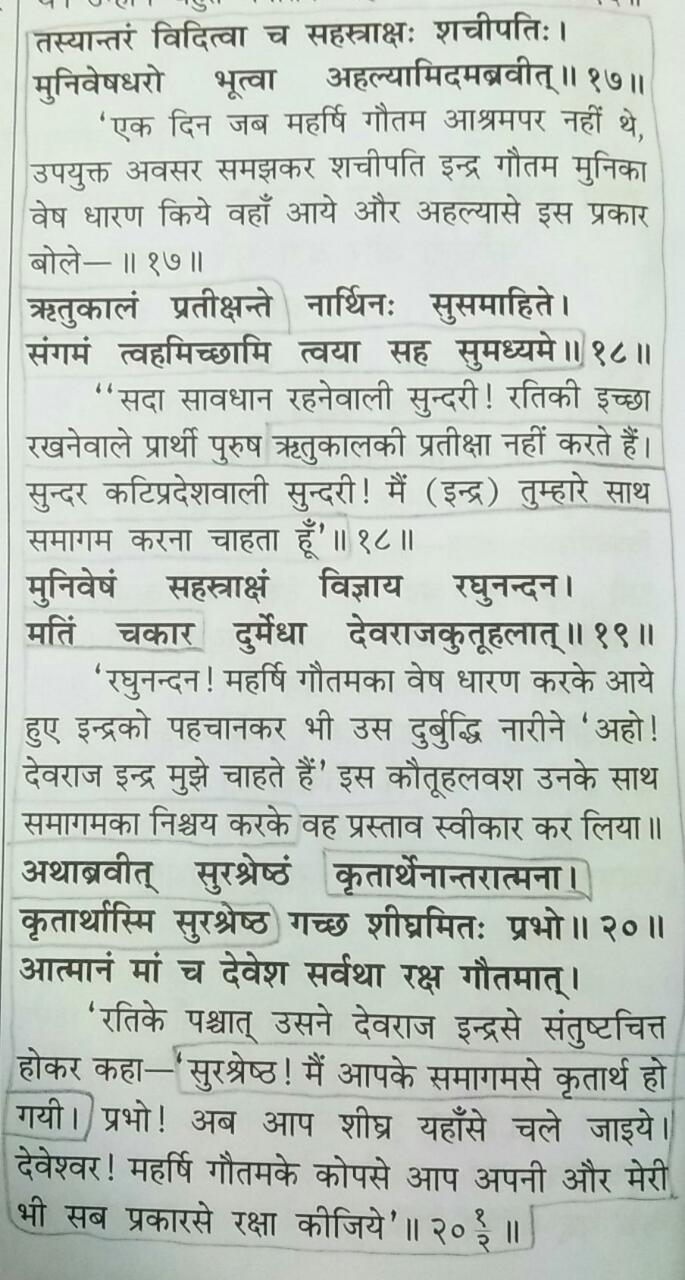
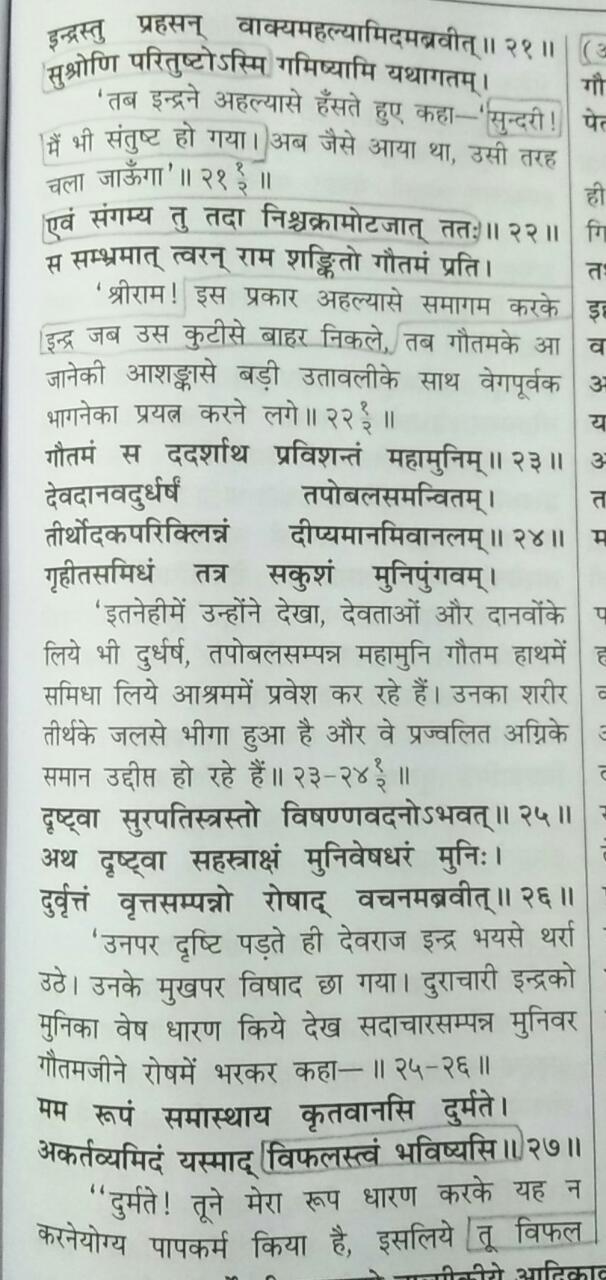
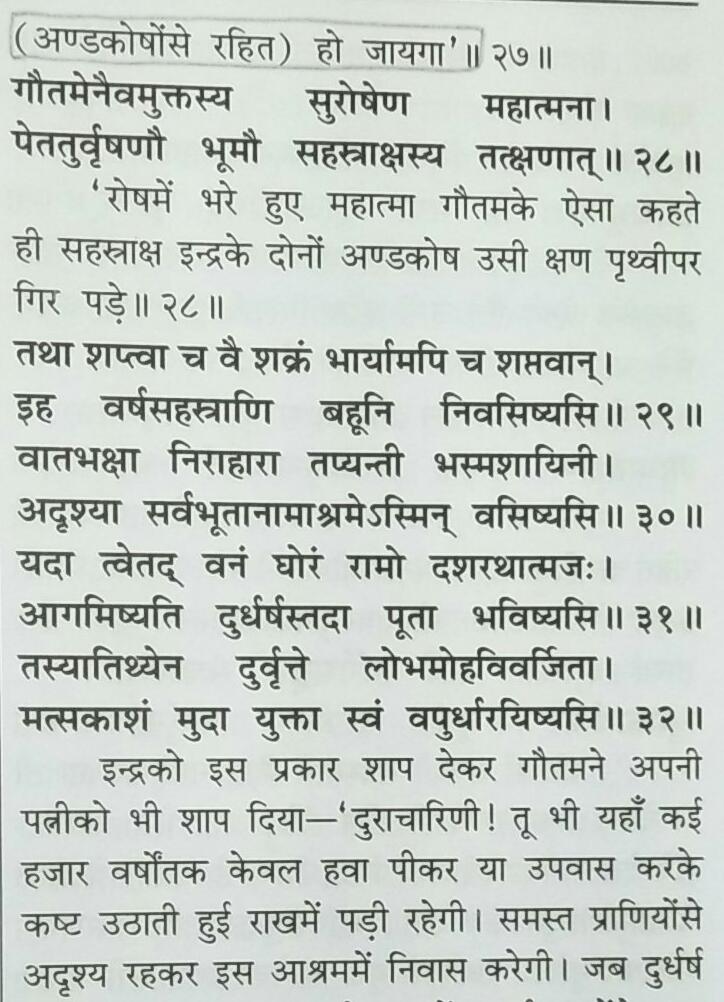
These verses have the roots of ‘extramarital sex’, because the lady Ahalya, the wife of Hindu Sage Gautama deceived her husband, and Hindu God Indra went into her. ‘Extramarital sex’ occurs when a married person engages in sexual activity with someone other than his or her spouse. This sin destroyed tranquility and peace of uncountable families. See the results of such stories, the survey says:
“48% of women who had extramarital affairs are moms.”
That’s what the feminists could abstract from the lady Ahalya’s erotic story of Valmiki Ramayana, and they call it ‘Freedom of life’.
But don’t forget: “Valmiki Ramayana is a religious book of Hindus.”
Now coming to the next chapter of the same story —
4. Balkanda, Chapter 49, Verses: 1-9
अफलस्तु ततश्शक्रो देवानग्निपुरोगमान्।
अब्रवीत्त्रस्तवदनस्सर्षिस्सङ्घान् सचारणान्।।1.49.1।।
कुर्वता तपसो विघ्नं गौतमस्य महात्मन:।
क्रोधमुत्पाद्य हि मया सुरकार्यमिदं कृतम्।।1.49.2।।
अफलोऽस्मि कृतस्तेन क्रोधात्सा च निराकृता।
शापमोक्षेण महता तपोऽस्यापहृतं मया।।1.49.3।।
तस्मात्सुरवरास्सर्वे सर्षिस्सङ्घास्सचारणा: ।
सुरसाह्यकरं सर्वे सफलं कर्तुमर्हथ।।1.49.4।।
शतक्रतोर्वचश्श्रुत्वा देवास्साग्निपुरोगमा:।
पितृदेवानुपेत्याहु स्सह सर्वैर्मरुद्गणै:।।1.49.5।।
अयं मेषस्सवृषणश्शक्रो ह्यवृषण: कृत:।
मेषस्य वृषणौ गृह्य शक्रायाऽशु प्रयच्छथ।।1.49.6।।
अग्नेस्तु वचनं श्रुत्वा पितृदेवास्समागता:।
उत्पाट्य मेषवृषणौ सहस्राक्षे न्यवेशयन्।।1.49.8।।
तदा प्रभृति काकुत्स्थ पितृदेवास्समागता:।
अफलान् भुञ्जते मेषान् फलैस्तेषामयोजयन्।।1.49.9।।
“Deprived of testicles, Indra with a frightened face addressed hordes of rishis and charanas with agni in the forefront:
‘I have accomplished the objective of the devatas by creating obstacles to Gautama’s austerities, evoking in consequence the wrath of the magnanimous sage’.
‘By his (Gautama’s) wrath I have been deprived of my testicles. She (Ahalya) has been deserted by him. He has lost his ascetic energy through the pronouncement of this great curse’.
‘For that reason, O rishis, charanas and great devatas it is your duty to restore my testicles for the benefit I have given you’.
“Hearing Indra, all the devatas accompanied by maruts. Lead by the Firegod devatas approached and said:
‘This ram (which has received the share of your sacrificial offerings) has testicles. As Indra has been deprived of his own take these testicles immediately and graft them on to Indra’.
“Hearing the words of the Firegod the pitrudevatas assembled uprooted the testicles of the ram and grafted them on to Indra.”
“O Son of the Kakutsthas, from then on the pitrudevatas have been accepting rams without testicles as offerings in a sacrifice, with ram’s testicles fitted on to Indra.” [Tr. IIT Kanpur]
Source: https://www.valmiki.iitk.ac.in/sloka?field_kanda_tid=1&language=dv&field_sarga_value=49
Can any Hindu tell me which type of xenotransplantation is this even modern medical science has not reached it yet!?
5. Aranya Kanda, Chapter: 46, Verses: 15-21&27
When Ravana arrives in a saint’s robes and starts praising Sita, he says:
का त्वं काञ्चनवर्णाभे पीतकौशेयवासिनि।।3.46.15।।
कमलानां शुभां मालां पद्मिनीव हि बिभ्रती।
ह्रीः कीर्तिः श्रीश्शुभा लक्ष्मीरप्सरा वा शुभानने।।3.46.16।।
भूतिर्वा त्वं वरारोहे रतिर्वा स्वैरचारिणी।
समाश्शिखरिणस्स्निग्धाः पाण्डुरा दशनास्तव।।3.46.17।।
विशाले विमले नेत्रे रक्तान्ते कृष्णतारके।
विशालं जघनं पीनमूरू करिकरोपमौ।।3.46.18।।
एतावुपचितौ वृत्तौ संहतौ सम्प्रवल्गितौ।
पीनोन्नतमुखौ कान्तौ स्निग्धौ तालफलोपमौ।।3.46.19।।
मणिप्रवेकाभरणौ रुचिरौ ते पयोधरौ।
चारुस्मिते चारुदति चारुनेत्रे विलासिनि।।3.46.20।।
मनो हरसि मे कान्ते नदी कूलमिवाम्भसा।
करान्तमितमध्यासि सुकेशी संहतस्तनी।।3.46.21।।
का त्वं भवसि रुद्राणां मरुतां वा वरानने।
वसूनां वा वरावोहे देवता प्रतिभासि मे।।3.46.27।।
“Who are you with a golden complexion, clad in yellow silk, and looking like a lotus-pond and wearing an auspicious lotus garland?”
“O lady with a beautiful face, with lovely thighs, are you ‘hri’, shyness personified? Are you the auspicious lovely Lakshmi, the goddess of wealth? Are you the goddess of fame? Are you an apsara? Are you Bhuti, the goddess of fortune? Or are you Rati, the goddess of love moving at your free will?”
“Your teeth are even and pointed, white and beautiful. Your eyes are large and clear and sparkling with dark pupils with a red tinge at the corner.”
“Your big hips are stout and strong, Your smooth thighs are like the trunk of an elephant, your breasts adorned with gems, are round and robust like palm fruits and drooping with heaviness with projected stiff nipples, shining and delightful, adding beauty.”
“O lady with an elegant smile, beautiful teeth, lovely eyes you are enticing. Your slender waist can be compassed by my fist. Your hair is beautiful and your large breasts are rubbing against each other. You are capturing my mind just as the flow of water in a river touches its banks.”
“O best of women O lady with beautiful buttocks can you be one of the Rudras or Maruts or Vasus? To me, you appear like a goddess.” [Tr. IIT Kanpur]
Source: https://www.valmiki.iitk.ac.in/sloka?field_kanda_tid=3&language=dv&field_sarga_value=46
Geeta Press Hindi translation:
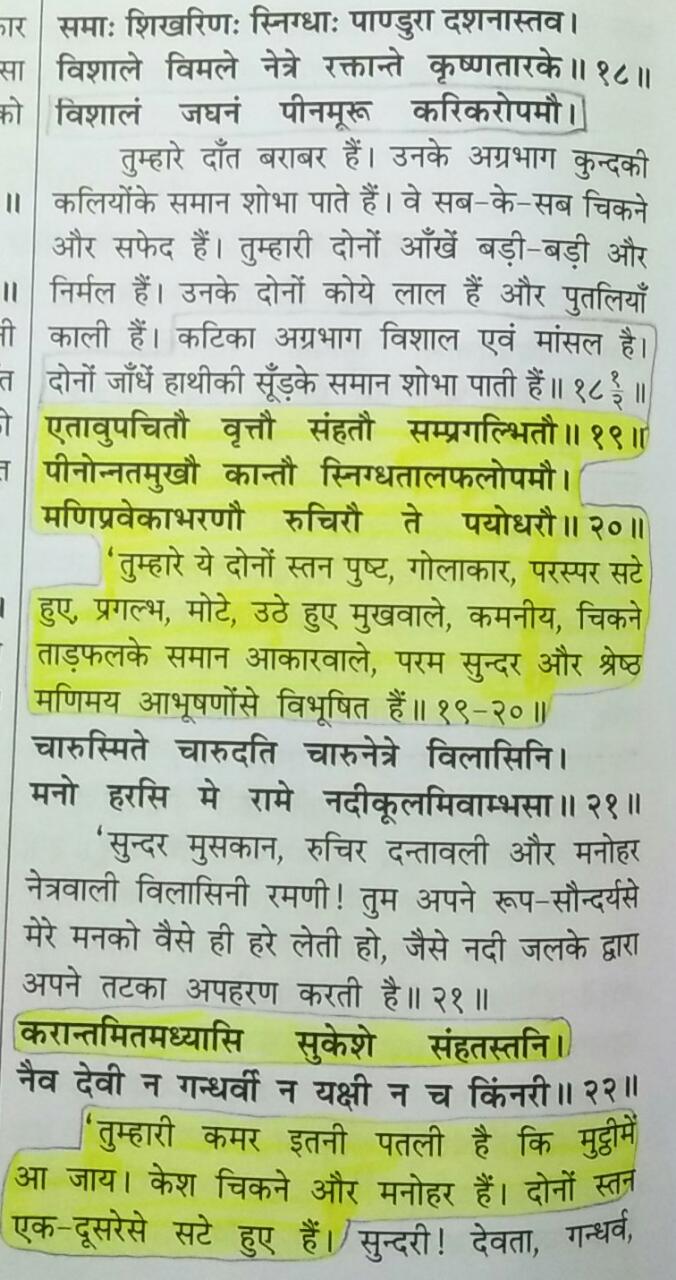

Dear Readers!
Have a look at these obscene verses, and see how this Hindu’s religious book ‘Valmiki Ramayana’ is slaying the significance of religiosity, morality, sanctity, piety and devoutness. Imagine when a Hindu becomes addicted to recitation of such vulgar epics, what kind of beatitude & sainthood he/she adorns of!
I feel genuine shame when see any Hindu talking about pietism & divinity.
Furthermore, it’s not about any common woman. It’s about their Goddess Sita Mata’s figure. Ravan described inflection points of Sita’s body to the extent of explaining her waist-to-hip ratio (WHR).
Even he says: “Your smooth thighs are like the trunk of an elephant”, this vulgar verse is indeed innovating the fornication of ‘thigh show’.
And when he says: “Your breasts adorned with gems, are round and robust like palm fruits and drooping with heaviness with projected stiff nipples, shining and delightful”, and he says: “Your slender waist can be compassed by my fist”, it means he is describing ‘hourglass figure’ of Sita.
Now, Hindus should tell me which type of sacredness is this? What does this vulgar book want to explain about your mother goddess Sita? Would you like to explain such private things about your own mother what your religious book does about your Sita Mata!?
But don’t forget: “Valmiki Ramayana is a religious book of Hindus.”
Again in —
6. Sundar Kanda, Chapter: 15, Verses: 28-29
When Hanuman sees Sita in the form, explained:
पूर्णचन्द्राननां सुभ्रूं चारुवृत्तपयोधराम्।।5.15.28।।
कुर्वतीं प्रभयादेवीं सर्वा वितिमिरा दिशः।
तां नीलकेशीं बिम्बोष्ठीं सुमध्यां सुप्रतिष्ठिताम्।।5.15.29।।
सीतां पद्मपलाशाक्षीं मन्मथस्य रतिं यथा।
“Her face resembled the fullmoon which dispelled the encircling gloom by its radiance. She had a slender waist, beautiful round breasts, shapely eyebrows, red lips, dark hair, and eyes like lotus petals with attractive limbs. She was comparable to Rati, consort of Cupid.” [Tr. IIT Kanpur]
Geeta Press Hindi translation:
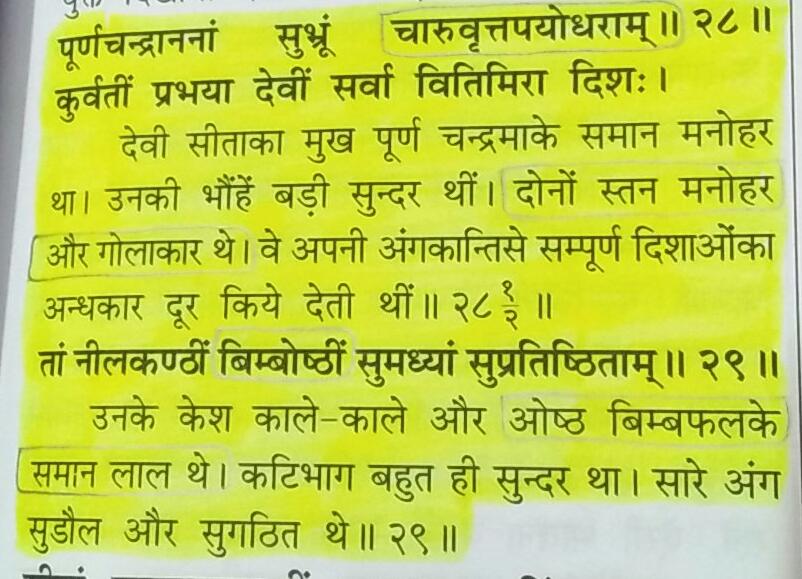
Once again in —
7. Sundar Kanda, Chapter: 58, Verse: 65
तं दृष्ट्वाथ वरारोहा सीता रक्षोगणेश्वरम्।
सङ्कुच्योरूस्तनौ पीनौ बाहुभ्यां परिरभ्य च।।5.58.65।।
“On seeing Ravana, the king of demons, beautiful Sita, full of fear hid her face and plump breasts between her thighs.” [Tr. IIT Kanpur]
Geeta Press Hind translation:
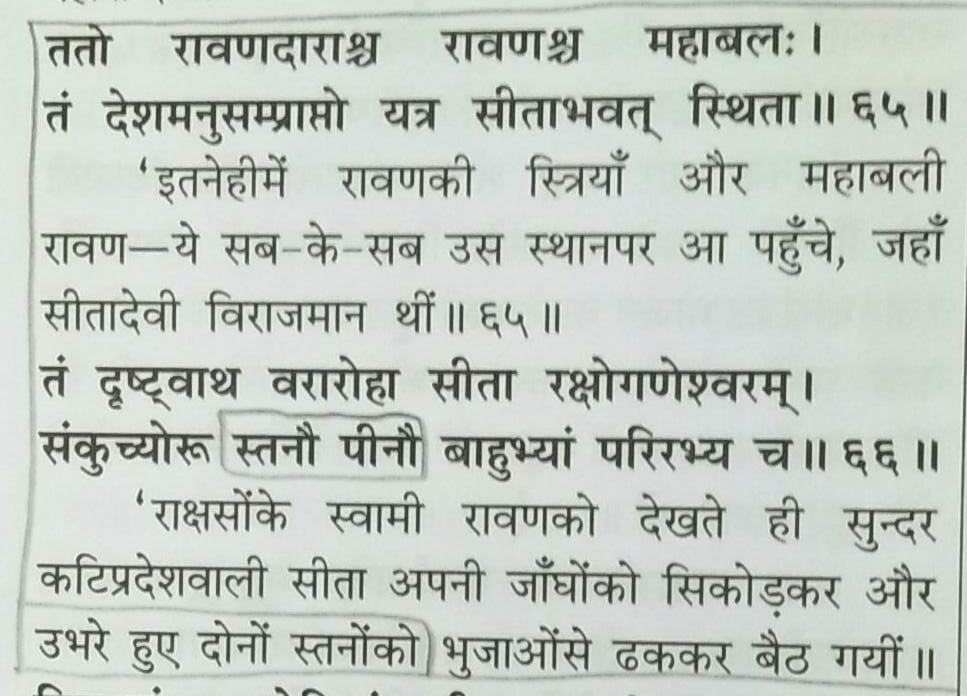
Further again in —
8. Yuddha Kanda, Chapter: 48, Verses: 9-11
Seeing her husband and Lakshman slain, Sita, afflicted with grief, burst into bitter lamentation, and says mentioning her body parts:
केशाः सूक्ष्माः समा नीला भ्रुवौ चासंहते मम।
वृत्ते चारोमके जंघे दन्ताश्चाविरला मम।।6.48.9
शंखे नेत्रे करौ पादौ गुल्फावूरू समौ चितौ।
अनुवृत्तनखाः स्निग्धाः समाश्चांगुलयो मम।।6.48.10
स्तनौ चाविरलौ पीनौ मामकौ मग्नचूचकौ।
मग्ना चोत्सेधनी नाभिः पार्श्वोरस्कं च मे चितं।।6.48.11
“My hairs are fine, equal, and blue; my eye-brows touch each other; my hips are devoid of down and round; and my teeth are close. My temples, and eyes, hands, feet, ankles, and thighs are equal. And my fingers are furnished with round nails, and are plump and even in the middle. And my breasts are close and firm and developed, and have their nipples sunk. And my navel is depressed, with high sides. And my chest is swelling.” [Tr. Manmanath Dutt]
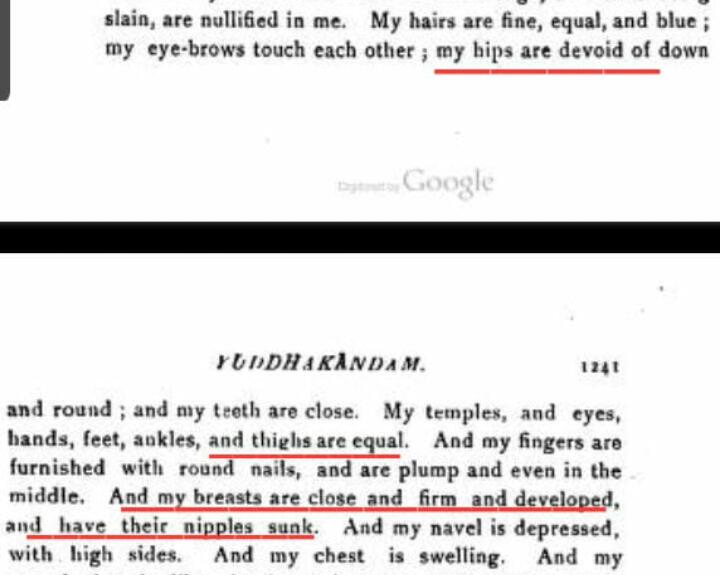
Another one translates:
“My locks are fine, of even length and dark, my eyebrows meet, my legs are round and smooth, my teeth evenly separated, the corners of my eyes are shaped like the conch, my breasts, bands, feet and thighs well proportioned, my nails smooth and polished, my fingers well-shaped, my breasts touch each other and have depressed nipples, my navel too is deeply indented, my bosom well-formed.”
[Tr. Hari Prasad Shashtri]

Hindi Translation by Dwaraka Prasad Sharma:
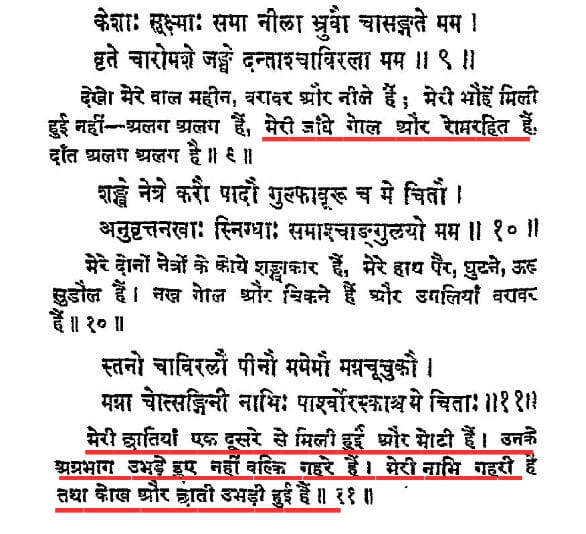
Geeta Press Hindi translation:
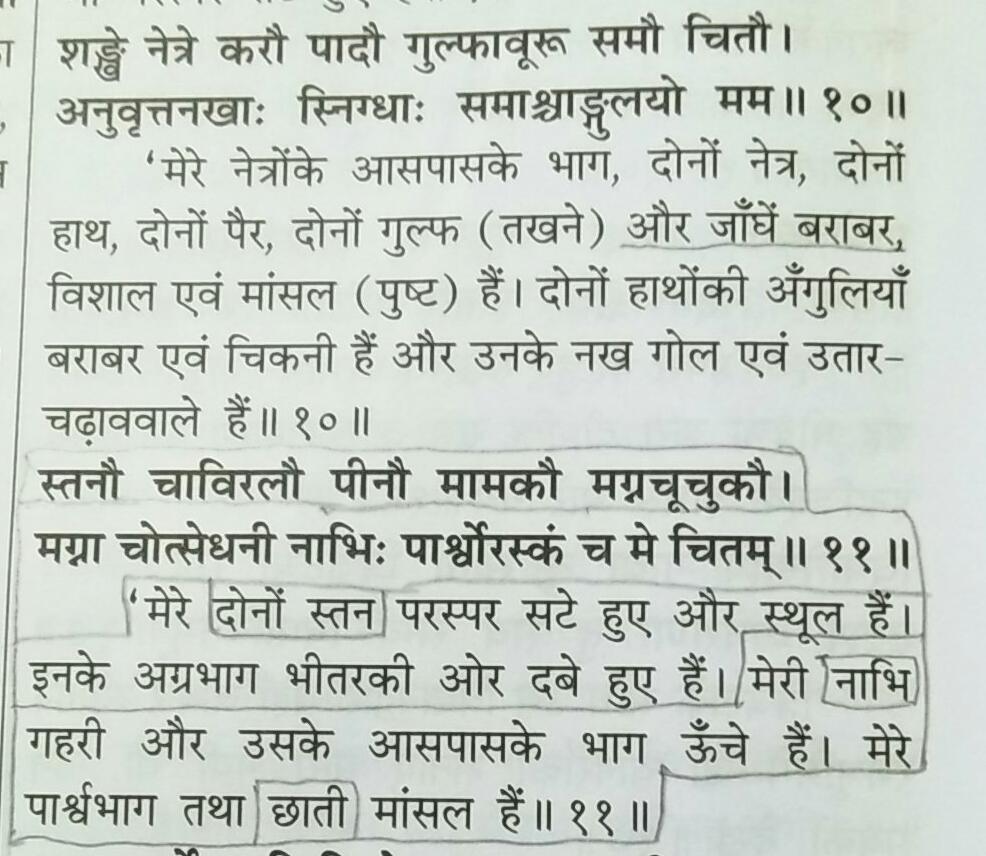
Can any Hindu explain me why your mother Sita’s plump breasts, wide hips and other erogenous zones are highlighted everywhere? Which sort of devotion is taught here in this religious book?
It is not only the evil Ravana, but even Sita herself has a polluted mouth as well. When the fictitious news of Rama’s death (a trick by Ravana) reaches Sita who is held hostage in Lanka, she laments that her body is no longer of any use because her husband has been slain; however, Sita also mutters about all the voluptuous features of her body.
But don’t forget: “Valmiki Ramayana is a religious book of Hindus.”
9. Kishkindha Kand, Chapter: 66, Verses: 10-20
Description of Hanuman’s birth goes on, and starts with how Windgod (वायु देवता) impregnated Hanuman’s mother Anjana, the wife of Kesri. Jambavan (divine-king of bears) tells Hanuman:
दुहिता वानरेन्द्रस्य कुञ्जरस्य महात्मनः।
मानुषं विग्रहं कृत्वा रूपयौवनशालिनी।।4.66.10।।
विचित्रमाल्याभरणा महार्हक्षौमवासिनी।
अचरत्पर्वतस्याग्रे प्रावृडम्बुदसन्निभे।।4.66.11।।
तस्या वस्त्रं विशालाक्ष्याः पीतं रक्तदशं शुभम्।
स्थितायाः पर्वतस्याग्रे मारुतोऽपहरच्छनैः।।4.66.12।।
स ददर्श ततस्तस्या वृत्तावूरू सुसंहतौ।
स्तनौ च पीनौ सहितौ सुजातं चारु चाननम्।।4.66.13।।
तां विशालायतश्रोणीं तनुमध्यां यशस्विनीम्।
दृष्टवैव शुभसर्वाङ्गीं पवनः काममोहितः।।4.66.14।।
स तां भुजाभ्यां दीर्घाभ्यां पर्यष्वजत मारुतः।
मन्मथाविष्टसर्वाङ्गो गतात्मा तामनिन्दिताम्।।4.66.15।।
सा तु तत्रैव सम्भ्रान्ता सुव्रता वाक्यमब्रवीत्।
एकपत्नीव्रतमिदं को नाशयितुमिच्छति।।4.66.16।।
अञ्जनाया वच्शुत्वा मारुतः प्रत्यभाषत।
न त्वां हिंसामि सुश्रोणि मा भूत्ते सुभगे भयम्।।4.66.17।।
मनसाऽस्मि गतो यत्त्वां परिष्वज्य यशस्विनीम्।
वीर्यवान्बुद्धिसम्पन्न: पुत्रस्तव भविष्यति।।4.66.18।।
महासत्त्वो महातेजा महाबलपराक्रमः।
लङ्घने प्लवने चैव भविष्यति हि मत्समः।।4.66.19।।
एवमुक्ता ततस्तुष्टा जननी ते महाकपे।
गुहायां त्वां महाबाहो प्रजज्ञे प्लवगर्षभम्।।4.66.20।।
“She was the daughter of a great king of monkeys called Kunjara. That young and beautiful lady had assumed a lustrous human form decked with wonderful garlands, ornaments and silk clothes and was roving on top of the mountain which appeared like a proud raincloud.”
“While the large-eyed lady was stationed on the mountain top, the Windgod gently let her auspicious yellow garment with red border fly away.”
“Then he (Windgod) saw her curved, well-set thighs, her beautiful plump breasts and her lovely pleasing face.”
“On seeing the broad hips, slender waist and beautiful limbs of that famous lady the Windgod was infatuated.”
“The Windgod lost his control over himself. His whole being was overpowered by love for her beautiful, flawless body. He embraced her with his long arms.”
“She was bewildered by this and being chaste and strict observer of chastity she said, ‘Who is it that has destroyed my monoandry?”
“On hearing Anjana’s words, the Windgod replied, ‘ O auspicious lady, I do you no harm, O lady of beautiful hips. I reached (enjoyed) you in mind, not body. You need not fear.'”
“O renowned lady I have embraced you and united with you mentally (enjoyed you without physical contact).You will bring forth a son endowed with great wisdom and courage.”
“He will be very powerful, illustrious and will be of great valour and strength. He will be my equal in leaping and flying’.”
“O great monkey O strongshouldered one having been assured that way, your mother was pleased and delivered you, a bull among monkeys, in a cave.” [Tr. IIT Kanpur]
Source: https://www.valmiki.iitk.ac.in/sloka?field_kanda_tid=4&language=dv&field_sarga_value=66
Geeta Press Hindi translation:
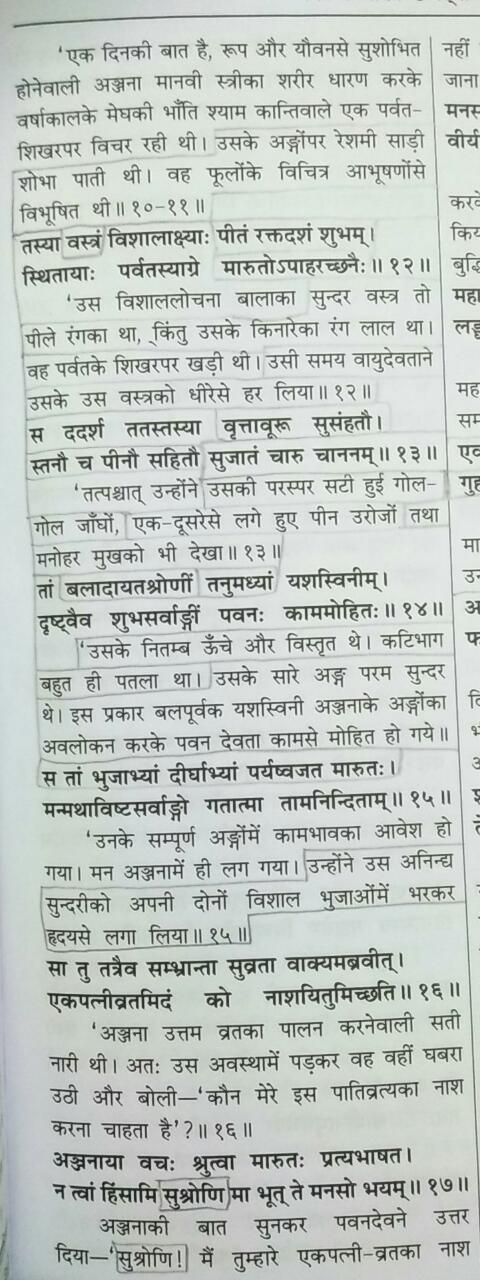
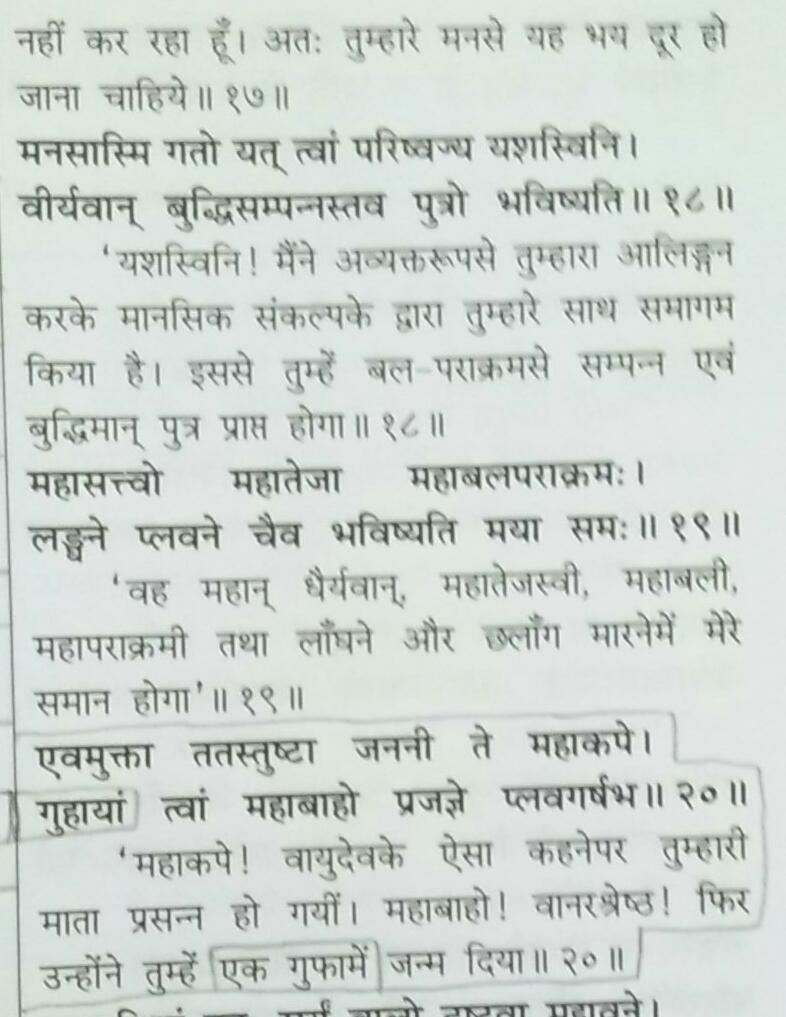
Dear Readers!
Are you having a look at these sexually explicit, profane and dirty stories of Valmiki Ramayana!?
Verse no. 11 and 12 talk about ‘Clothing Fetishism’, and the last part of the verse 12 is talking about ‘clothes off sex’ when it says: “The Windgod gently let her auspicious yellow garment with red border fly away.”
Now ‘eye sex’ by Windgod started in verse no. 13 and continues with ‘leg show’, ‘thigh show’, ‘breast show’, and staring at ‘broad hips’ & ‘slender waist’ in verse 14. This ends in verse 15 to 20 with ‘holding hand’, ‘hugging’, ‘impregnation’ and birth of Hanuman in a cave. It isn’t any secret that the Vedas and Puranas are full of sexual tales, essentially these are hardcore pornographic literature. But I never expected such things from Valmiki Ramayana.
I am questioning again: “Why are the full swelling breasts of your mother Sita and Anjana highlighted in this religious text, and their other erogenous body parts as well? Would you like to mention the same about your own mother?”
But don’t forget: “Valmiki Ramayana is a religious book of Hindus.”
Now, Rama’s body parts explained —
10. Sundar Kanda, Chapter: 35, Verse: 17
While requested by Sita, Hanuman explains bodily symbols of Rama:
त्रिस्थिरस्त्रिप्रलम्बश्च त्रिसमस्त्रिषु चोन्नतः।
त्रिताम्रस्त्रिषु च स्निग्धो गम्भीरस्त्रिषु नित्यशः।।5.35.17।।
Word by word translation by IIT Kanpur:
त्रिस्थिरः has the three stiff limbs (chest, fist and wrists), त्रिप्रलम्बश्च long in three (arms, eyebrows and scrotum), त्रिसमः has three even parts (locks of hair, knees and testicles), त्रिषु elevated in three parts (abdomen, navel and chest), उन्नतः raised, त्रिषु च all the three parts (soles, nails and eyes), स्निग्धः has coppery reddish colour, नित्यशः all over, त्रिषु in the three parts (the underlines of feet, the hair and the reproductive organs), गम्भीरः is majestic.
[He has three stiff parts, three long parts, three even parts, three shining parts, elevated in three parts, has three raised parts, his body has lines in three parts and is of coppery reddish colour in three parts. He has a majestic look.]
Geeta Press Hindi translation:
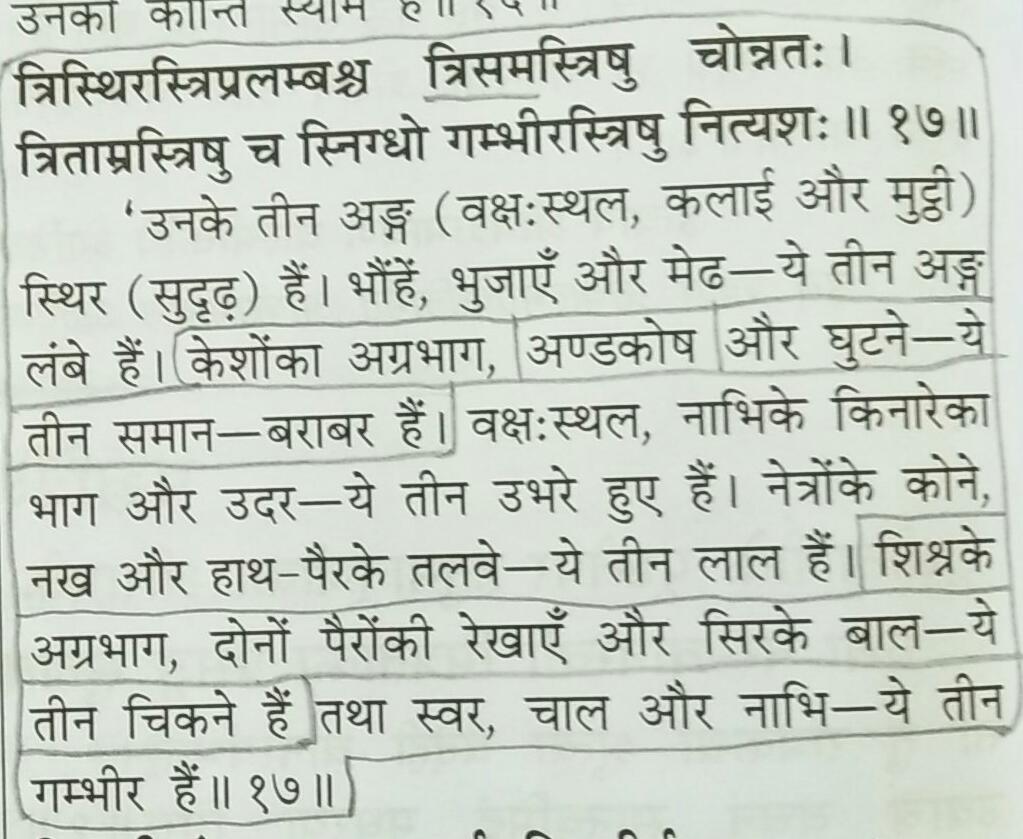
Hindi translation by Dwaraka Prasad Sharma:
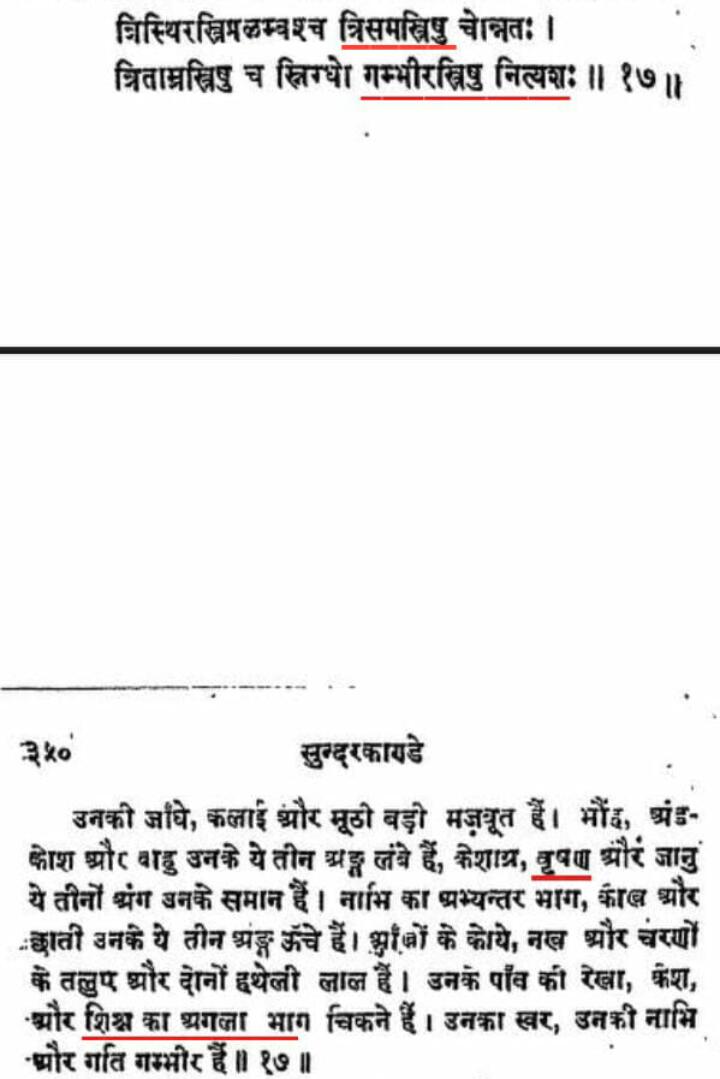
Now, happens the genocide of all sorts of morality, when the sex organs of gods are lifted up by their devotees. Even if a tongue recites these pornographic verses, it will scold itself: ‘Shut the hell up!’
But don’t forget: “Valmiki Ramayana is a religious book of Hindus.”
11. Ayodhya Kanda, Chapter: 19, Verse: 7
Hindu god Rama tells Kaikeyi (mother of Bharat) that had she (or his father) simply asked him, he’d have gladly given away (his right to) the kingdom & everything he possessed, including Sita, to half-brother Bharata:
अहं हि सीतां राज्यं च प्राणानिष्टान्धनानि च।
हृष्टो भ्रात्रे स्वयं दद्यां भरतायाप्रचोदितः।।2.19.7।।
“Unurged, I would have gladly given to Bharata the kingdom, wealth, my most coveted life, and even Sita.” [Tr. IIT Kanpur]
Geeta Press Hindi translation:
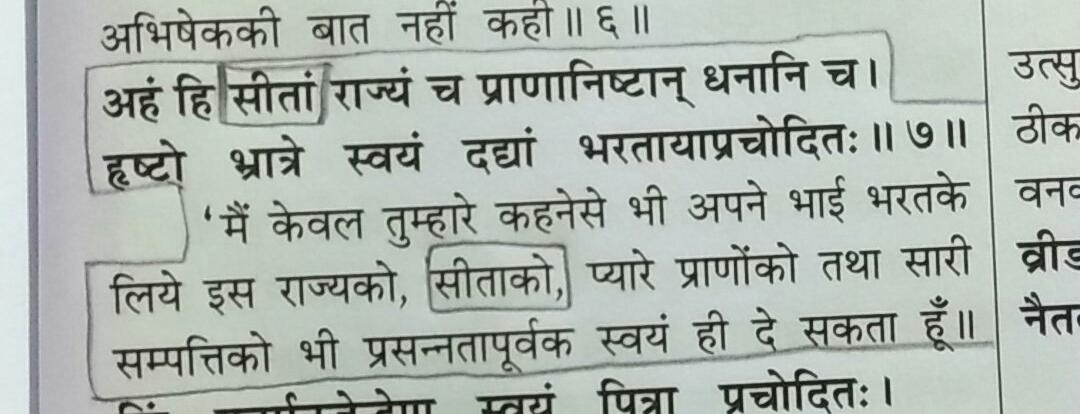
I would like to ask which type of ‘spousal abandonment’ is this? And why was the Hindu concept of ‘सात जन्मों का रिश्ता (relationship of seven births)’ forgotten by Rama?
But don’t forget: “Valmiki Ramayana is a religious book of Hindus.”
Hindus claim: “Their scriptures are factual story-teller.”
I say: Being fictional or factual does not matter, the authenticity given by scholars matters.
Hindu frauds like Narsinhanand Saraswati & Pushpendra Kulshreshtha who have venomous mouth against other religious personalities and addicted of mental intoxication when talk about other religions, are bound to answer:
“If your religious books indeed say what I quoted above, what is the difference between your these sacred texts and top-shelf magazines?”
“If it is religious epic, what problems you Hindus face in accepting ‘adult magazines’ as your holy books?”
“After seeing such nudity, the Ramayana should lead the list of well-known erotic magazines like ‘Playboy’, ‘Penthouse’, ‘Playgirl’ and ‘Hustler’. If yes, I agree. If not, why?”
Conclusively, instead of just throwing stones at everything we Muslims propose, why don’t you Hindus contribute some constructive suggestions for a change in yourself? Due to the intense hatred, all you Hindus do is throw stones. You are all over us about our divine faith Islam, but you start pouting when we point out that you have such and such things in your sacred texts! What, you can dish it out, but you can’t take it!? Hindu fanatics also must stop throwing bone to common Hindus by acknowledging the need for their help.
Qur’ān 85:8 tells about the peaceful reason behind their hatred:
“And what did they dislike from the Muslims, except that the Muslims accepted faith in Allah the Most Honourable, the Most Praiseworthy?” [Tr. Kanzul Īmān]
कोई टिप्पणी नहीं:
एक टिप्पणी भेजें